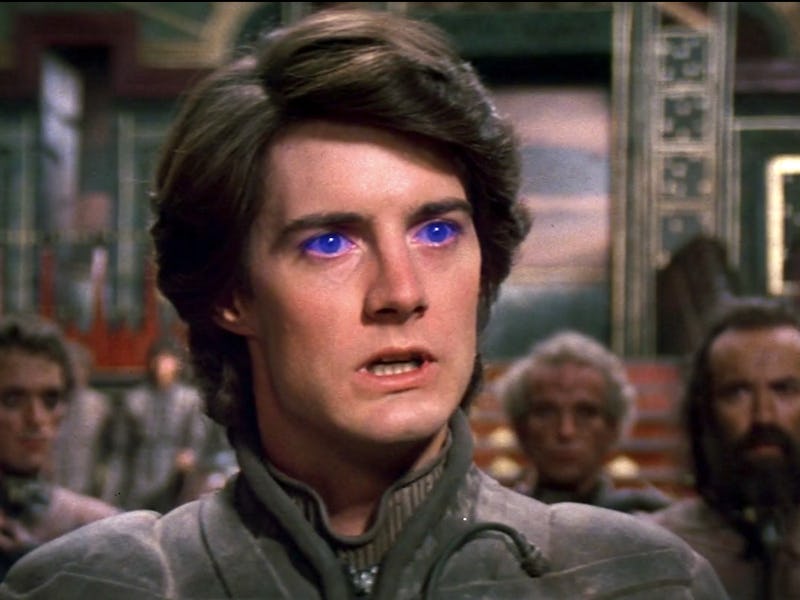Dune 2020 needs to keep 3 awesome elements of David Lynch's adaptation
Lynch's Dune is not great, but it got a few things right.

The history of live-action Dune adaptations is a mess. From the never-made (and wildly unfaithful) Jodorowsky version, to the 1984 David Lynch version, to the 2000 Sci-Fi Channel miniseries, each Dune misses the mark in some way, shape, or form, even when the movie isn't actually completed. In the months ahead of the debut of Denis Villeneuve's Dune, the Dune many of us still have in our minds is probably the David Lynch version. Lynch disavowed Dune upon its release and continues to do so to this day. Yet, if you've seen ads for his Masterclass, you'll notice Dune is mentioned and featured. On some level, Lynch's Dune endures, even when nobody really wants it to.
Here are three things Dune 2020 will hopefully retain from Lynch's Dune.
In 1984, everybody loves Leto, even the Fremen.
3. Let Paul and his father, Duke Leto, be likable
Something that gets lost when we talk about Dune is the idea that Frank Herbert's intention was to critique the idea of heroes in general. As the author said, "The bottom line of the Dune trilogy is: beware of heroes. Much better rely on your own judgment and your own mistakes."
Since Paul Atreides and his family are central to a film version of Dune, it's tough to play with the audience's emotions too much. Lynch's Dune is lighter on the cautionary aspects of Paul as a hero, and that's probably for the best. Dune is really bleak overall, and the actual villains are so repulsive, you kind of need some "good guys" to root for.
This isn't to say Lynch made Paul and Duke Leto into saints in the 1984 version, but they are a little easier to like than in the book. Villeneuve will likely poke some holes in the conventional hero's journey but probably won't pit us against Paul and his family. Dune 1984 gets many things wrong, but Paul (Kyle MacLachlan), Leto (Jürgen Prochnow), and Lady Jessica (Francesca Annis) are all fantastic rendered. Let's hope our new Atriedes family — Timothée Chalamet, Oscar Isaac, and Rebecca Ferguson — are just as endearing.
2. Give us that creepy-sounding "Voice"
In all versions of Dune, the Bene Gesserit — and later Paul — have the ability to use a power called "the Voice." This is essentially an auditory version of a Jedi mind trick; a certain creepy way of speaking compels a listener to do whatever the speaker demands. Certain people can resist "the Voice," but for the most part, it's a pretty slick magical power.
The way "the Voice" rendered in Lynch's Dune is not only memorable but 100 percent effective. It's equal parts horror-movie demon voice with a touch of a mystical fantasy witch vibe. It's really cool. Toward the end of Lynch's Dune, when Alia Atreides (Alicia Witt) says, "For, he IS the Kwisatz Haderach!" it's hard to deny that level of awesomeness. (Arguably, Alia isn't speaking in "the Voice" in this scene, but still.)
Literally the movie telling you what is going on.
1. Frontload the world-building
Although some might say Dune 1984 is clunky and slow in its opening moments, the huge amount of exposition it serves up in the first 15 minutes help out the rest of the movie significantly. One scene that comes to mind, in particular, is when Paul studies the particulars of the planet Arrakis, the Emperor, and House Harkonnen. These sequences are mostly just text and graphics on the screen, which many find off-putting. Princess Irulan's opening monologue is similarly heavy on exposition.
The reason this doesn't work in Lynch's Dune is that all of these sequences are literally too long. But, it's also impossible to imagine the movie without this approach. Frank Herbert's novel (infamously) has a glossary in the back in case you're confused about what a Giedi Prime is or why the Bene Gesserit orders are so formidable. A movie can't have a glossary, so putting a lot of exposition at the beginning of Lynch's Dune makes sense. It can be accomplished naturalistically, but it should be done at the start. As the opening words of the novel attest: "A beginning is the time for taking the most delicate care that the balances are correct."
Dune (2020) comes to theaters on October 1, 2021.
This article was originally published on